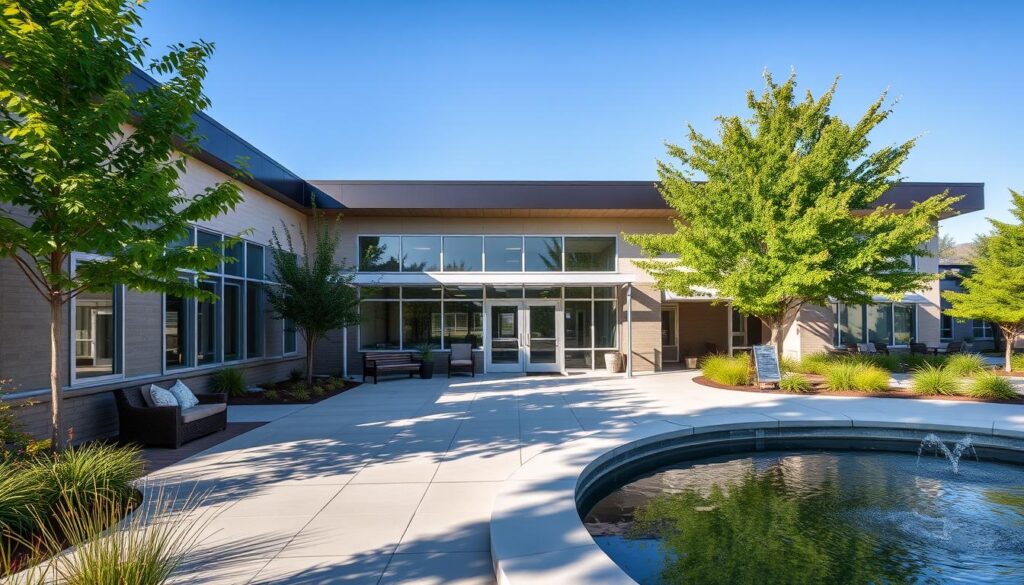In the United States, you can get good mental health care. You can get help for free or low cost, in many languages. This is true no matter your insurance, age, where you’re from, or how much money you have.
Your local mental health hospital wants to help you. They offer care that is kind and made just for you. This care is to help you or your loved ones deal with mental health issues and live happy lives.
New York City has guides to help you find mental health and substance use services. These guides are in many languages like Arabic, Bangla, Chinese, French, Haitian Creole, Korean, Polish, Russian, Spanish, and Urdu. They can help you find the right help for your needs and situation.
Key Takeaways
- Guaranteed access to quality mental healthcare in the United States
- Low- or no-cost services available in multiple languages
- Personalized care at your local mental health hospital
- Comprehensive guides to find the right mental health services
- Support options tailored to your individual needs and circumstances
Understanding Mental Health Support Services
There are many ways to get help for mental health. You can get care in a hospital or through therapy. It’s important to know what services are out there and how to get them.
Types of Available Mental Health Care
How long you need treatment depends on your situation. Hospital stays can last from 3 to 7 days. Some programs last up to 90 days.
Partial Hospitalization Programs meet for several days a week. Intensive Outpatient Therapy has sessions 3 to 5 days a week. Outpatient therapy usually happens once a week for 45-50 minutes.
Insurance and Payment Options
If you have insurance, the Community Health Access to Addiction & Mental Healthcare Project (CHAMP) can help. It makes it easier to get mental health services. If you don’t have insurance, NYC Care offers low-cost or no-cost services.
Accessibility and Language Support
Mental health help is available in NYC Public Schools. These programs meet the needs of all students and families. They offer care in many languages and cultures.
Emergency Mental Health Services and Crisis Support
When you’re in a mental health crisis, it’s good to know mental wellness hospitals and emotional well-being institutions have help. They offer emergency services to give you the care you need. These services help quickly and effectively, guiding you through tough times.
The 988 Suicide & Crisis Lifeline is a free, confidential service. It’s available 24/7 for mental health crises like suicidal thoughts or depression. Trained counselors are ready to listen and help you find local support.
Emotional well-being institutions also have mobile crisis teams. They can come to you within hours to help in a crisis. These teams work with police and emergency services for full care.
| Emergency Mental Health Services | Description |
|---|---|
| 24-hour Crisis Hotlines | Provide immediate assessment, counseling, and referrals to local resources. |
| Walk-in Crisis Clinics | Offer prompt attention and care in a less intensive setting than hospitals. |
| Mobile Crisis Teams | Intervene on-site during crises and can facilitate hospitalization if needed. |
| Crisis Stabilization Units | Provide short-term, inpatient psychiatric care to stabilize individuals in crisis. |
| Emergency Room Visits | Necessary for urgent situations like suicide attempts or severe symptoms. |
Remember, your local mental wellness hospital and emotional well-being institution are here for you in crisis. Don’t hesitate to reach out for their help.
Your Local Mental Health Hospital: Services and Programs
Your local psychiatric hospital is a great place to find help. They have many services for people with mental health issues. These include inpatient, outpatient, and special care programs.
Inpatient Treatment Programs
Inpatient care means you get help all day, every day. It’s for those with serious mental health problems. You’ll get:
- Comprehensive psychiatric evaluations
- Medication management
- Individual and group therapy
- Occupational and recreational therapy
- Aftercare planning and discharge support
Outpatient Services
Outpatient services help you keep going after you leave the hospital. You can get:
- Partial hospitalization programs
- Intensive outpatient programs
- Individual and group counseling
- Medication management
- Community-based support services
Specialized Care Units
Some hospitals have special units for certain needs. For example:
| Care Unit | Focus |
|---|---|
| Geriatric Psychiatry | Mental health issues in older adults |
| Addiction Treatment | Co-occurring mental health and substance abuse disorders |
| Trauma-Informed Care | Mental health treatment for individuals with a history of trauma |
Knowing what your local hospital offers can help you find the right care. You can get help for inpatient psychiatric care and mental health rehabilitation.
“The staff at the hospital were incredibly compassionate and supportive throughout my entire treatment process. I’m grateful for the specialized care they provided, which has been instrumental in my recovery.”
Mobile Crisis Teams and Immediate Response
In urgent mental health or behavioral crises, mobile crisis teams help a lot. They have mental health experts and trained peers. They quickly help, assess, and connect you with more help.
In the U.S., these teams are changing how we handle mental health crises. In Delaware, you can call the Northern Delaware Mobile Crisis Intervention Services at 800-652-2929 or the Southern Delaware MCIS at 800-345-6785. They help kids and adults with crisis intervention and connect them to care.
In Maryland, teams are in places like Anne Arundel, Baltimore, and more. Call 9-8-8 for help. They also offer special debriefing services in some areas.
Mobile crisis teams are very important. They can lower hospital and jail rates by up to 85%. They offer support right away, helping you avoid bad experiences.
As mental health care grows, so does the need for mobile teams. People want these services everywhere. Thanks to the American Rescue Plan Act and grants, we’re moving forward. This brings hope to those in need.
| Location | Mobile Crisis Team Services | Contact Information |
|---|---|---|
| Northern Delaware | Mobile Crisis Intervention Services (MCIS) | 800-652-2929 |
| Southern Delaware | Mobile Crisis Intervention Services (MCIS) | 800-345-6785 |
| Wilmington, DE | NET Detox – 24/7 medically monitored inpatient detoxification treatment | N/A |
| Newark, DE | Recovery Innovation Recovery Response Center (RRC) – Facility-based crisis services for adults experiencing mental health or substance abuse crisis, open 24/7, 365 days a year | N/A |
| Harrington, DE | Harrington Detox | 302-786-7800 |
| Ellendale, DE | Recovery Response Center – Provides recovery support services and crisis stabilization services to prevent inpatient hospitalization, has a Living Room for crisis alternatives | N/A |

Remember, you’re not alone in a mental health crisis. Call mobile crisis teams or 9-8-8 for help. They offer support and resources for your journey.
Mental Health Support for Children and Adolescents
It’s hard for kids and teens to deal with mental health issues. Luckily, your local mental health hospital and psychiatric facility have special programs. They help during important growth times.
School-Based Programs
Local mental health hospitals work with schools. They offer counseling, crisis help, and mental health lessons. These programs spot and help with mental health problems early. This way, kids can do well in school and with friends.
Family Support Services
It’s tough to care for a child with mental health issues. Your local mental health hospital has help for families. They offer workshops, family therapy, and support groups. These help families understand and handle mental health better.
Youth Crisis Intervention
When a young person has a mental health crisis, they need help fast. Mental health hospitals have teams ready 24/7. They offer crisis support, like mobile help and inpatient care. These teams aim to calm crises and find long-term help.
Your local mental health hospital and psychiatric facility support kids and teens. They offer many services to help young people grow and thrive. Reach out to learn more about what they can do for your community.
“Mental health support for children and adolescents is crucial for their overall well-being and development. At our local mental health hospital, we are committed to providing a range of specialized services to meet the unique needs of young people in our community.”
Behavioral Health Centers and Treatment Options
Behavioral health centers in your area are great for mental illness treatment. They have many services for people with mental health issues.
Cedar Springs Hospital is a good example. They have many programs for adults and kids. They help with depression, PTSD, and substance abuse.
- They also have special programs for veterans. These help with PTSD and getting back to civilian life.
- Cedar Springs Hospital takes most insurances, including TRICARE®. This makes their services more accessible.
- The center is open 24/7 and is accredited by The Joint Commission. They provide quality care and help in crises.
If you or someone you love needs mental health help, check out your local center. Starting treatment is the first step to feeling better and getting the care you need.

“The staff at Cedar Springs Hospital have been incredibly supportive and understanding. Their programs have made a real difference in my life.”
Finding the Right Mental Health Hospital Near You
Looking for help with mental health or psychological disorders? It’s key to find a place that offers the care you need. Luckily, there are ways to find the right mental health facility near you.
Location-Based Services
In New York, the NYC 988 hotline is a great help. It connects you with mental health providers, no matter your insurance. You can find providers on the nyc.gov/988 website or by calling 988.
If you have insurance, check your network online. Or call your insurance’s customer service.
Specialized Treatment Centers
The New York State Office of Mental Health has a big program directory. You can search by location and specialty. This is great if you need specific treatments, like inpatient care or therapy for depression or anxiety.
Regions Hospital is a top mental health hospital in the area. It has 120 inpatient beds for adults. Their DayBridge program offers intensive therapy for adults 18 and older.
Finding the right mental health hospital is very important for your health. Take time to look at your options. And don’t be afraid to ask for help in finding the right place.
“Psychiatrists undergo 8 to 10 years of training to understand physical and mental health ties deeply.”
Support Groups and Community Resources
Finding the right support system is key to your mental wellness journey. In your area, you’ll find many support groups and resources. They help those affected by mental health challenges and their families.
The National Alliance on Mental Illness (NAMI) offers great support. They have peer-led support groups. These groups meet in local chapters, offering a safe space to connect with others who get you.
For parents of children with special needs, NAMI’s Parent-Match program and support groups are very helpful.
The Depression and Bipolar Support Alliance (DBSA) also offers support groups. These groups help people with mood disorders feel connected and understood. Sharing experiences and finding hope together is powerful.
Local mental wellness hospitals and emotional well-being institutions also have support groups. They cover topics like grief, trauma, addiction recovery, and LGBTQI+ support.
Online support groups and forums are great for those who can’t meet in person. They help people feel connected, especially in rural areas.
You don’t have to face mental health challenges alone. Reach out to local mental wellness hospitals, emotional well-being institutions, or community organizations. They can help you find support groups and resources. Connecting with others who understand is a big step towards healing and growth.
| Organization | Support Services |
|---|---|
| National Alliance on Mental Illness (NAMI) | Peer-led support groups, Parent-Match program |
| Depression and Bipolar Support Alliance (DBSA) | Support groups for individuals living with mood disorders |
| Local mental wellness hospitals and emotional well-being institutions | Support groups on various mental health topics |
| Online communities and discussion forums | Virtual support and connection for individuals with limited access to in-person resources |
“Peer support is considered a helpful tool for recovery by many individuals, as it can reduce isolation and loneliness, and provide a sense of community and understanding.”
Mental Health Services for Special Populations
It’s important to see the special needs of different groups. This includes LGBTQI+ people, veterans, and those who need help in many languages. The mental health system needs to change to help everyone better.
LGBTQI+ Support Services
NYC 988 has special help for LGBTQI+ youth and young adults. It’s a safe place for them to talk about their mental health. This helps because LGBTQI+ people often face big mental health challenges.
Veterans Mental Health Care
The Veteran’s Crisis Line is a big help for our veterans. It offers crisis support and helps them find mental health services. This program makes sure veterans get the care they need.
Multilingual Services
The mental health system is getting better at helping many languages. NYC 988 lets people get help in over 200 languages. This helps everyone get the care they need, no matter what language they speak.
These special programs show we care about everyone’s mental health. They help us make a system that works for all. We want to help everyone feel safe and supported on their mental health journey.
Navigating Mental Health Treatment Programs
Looking for mental health help can feel scary. But, with the right tools, you can find your way. The Health Information Tool for Empowerment (HITE) helps New Yorkers find free or low-cost services. This includes mental health care.
Don’t know where to begin? NYC 988 has caring counselors ready to help. They guide you through mental health services, from inpatient care to mental illness treatment programs.
Having trouble with insurance? CHAMP can help. They solve problems for substance use and mental health services. They make sure you know your coverage and fight for your care.
You don’t have to face this alone. Use these resources to start your journey to better mental health. Find the support you deserve.
“One in five adults experience mental illness each year, so it’s crucial to know where to turn for help.”
| Resource | Contact Information | Services Offered |
|---|---|---|
| NAMI HelpLine | Monday to Friday, 10 a.m. to 10 p.m. ET | Information and support for individuals and families affected by mental illness |
| Crisis Lifeline (988) | Available 24/7 | Emergency mental health support and crisis intervention |
| SAMHSA Hotline | 1-800-662-4357 | Referrals for substance abuse and mental health treatment |
| NAMI Helpline | 1-800-950-6264 | Information and support for individuals and families affected by mental illness |
Crisis Prevention and Intervention Services
When you face a mental health crisis, you can count on help. New York City has many services ready to support you. They offer the care you need during tough times.
24/7 Crisis Hotlines
If you’re in a mental health emergency, help is always available. Call the Suicide & Crisis Lifeline at 988 anytime. The New York State Domestic Violence Hotline is at 1-800-942-6906.
For text support, text “Got5” to 741-741. This is the Crisis Text Line.
Emergency Response Teams
Your local mental health hospital or psychiatric facility has emergency teams. They help in urgent situations. These teams are ready to provide quick help.
If you need fast help or are in danger, call 911. It’s the best way to get help right away.


A Life-Changing Experience with This Weight Loss Supplement (Nagano Tonic)
I’ve always struggled with finding a weight loss solution that actually works for me. Like many, I’ve tried numerous diets, exercise routines, and supplements over the years—some worked for a short time, but nothing ever gave me long-term results. That was until I decided to try the weight loss supplement I found : Link to the Supplement.
From the moment I started using it, I noticed a difference. Not only did I feel more energized, but my cravings also became more manageable. The best part? I started seeing results much quicker than I anticipated! Over the course of just a few weeks, I noticed a significant reduction in belly fat and overall weight loss that I hadn’t been able to achieve before.
What makes this supplement stand out from all the others I’ve tried is how it supports me in my daily routine without any jitters or energy crashes. I’m able to stay focused and motivated, which has made it easier to stay on track with my diet and exercise plan.
This product truly exceeded my expectations, and I feel more confident and healthier than ever before. If you’re struggling with your weight loss journey like I was, I highly recommend giving this supplement a try. It’s been a game-changer for me, and I’m sure it can work wonders for you too!
Contant Them on email .. tonicnagano50@gmail.com
I’ve tried so many weight loss products over the years, but nothing worked like this supplement! Since I started using it, I’ve noticed a big difference in my energy levels and appetite control. In just a few weeks, I’ve lost weight and feel so much better. It’s been easy to stick with, and the results speak for themselves. Highly recommend this to anyone looking to make a real change!
wasn’t sure what to expect, but this weight loss supplement has really impressed me! After just a few weeks of use, I’ve already dropped a few pounds and feel more motivated to stay active. It’s helped curb my cravings and boosted my energy throughout the day. I’m excited to keep going and see even better results. Definitely worth trying!
Reach them on tonicnagano50@gmail.com
This Nagano Tonic has been amazing! In just a few weeks, I’ve lost weight, feel more energized, and my cravings are under control. Highly recommend it!
Thats the link to purchase http://surl.li/iasppy